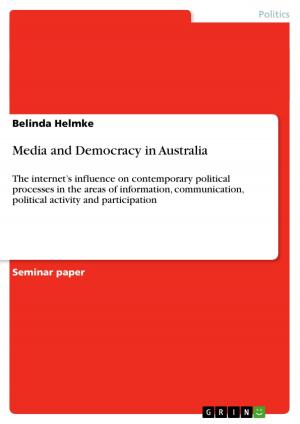To what extent do legal norms relating to the use of armed force influence governments' desire to secure Security Council endorsement of their military actions?
Nonfiction, Social & Cultural Studies, Political Science, International, International Relations| Author: | Timo Dersch | ISBN: | 9783656332916 |
| Publisher: | GRIN Verlag | Publication: | December 11, 2012 |
| Imprint: | GRIN Verlag | Language: | English |
| Author: | Timo Dersch |
| ISBN: | 9783656332916 |
| Publisher: | GRIN Verlag |
| Publication: | December 11, 2012 |
| Imprint: | GRIN Verlag |
| Language: | English |
Essay from the year 2012 in the subject Politics - International Politics - Topic: International Organisations, grade: 1, University of Massachusetts - Amherst, language: English, abstract: In his article on The Political Origins of the UN Security Council's Ability to Legitimize the Use of Force, Erik Voeten states that the observation of state behavior could lead us to the assumption that it is costly for a state to not get the Security Council's (SC) approval for a forceful action against another state. Costly, could on the one hand refer to an extreme increase considering funding issues. Without proper legitimization, it seems to be harder for states to find cooperatives because, 'governments are more willing to cooperate voluntarily once the SC has conferred its blessing' (Voeten 528). This leads to higher funding costs for the operating state. On the other hand, the costs of a unilateral act might lie in the decline of support and reputation a state government gets within the international society and amongst its own population in general. Therefore, Voeten seems to argue that political elites do not necessarily consider the SC as an, 'independent judgment on the appropriateness of an intervention', but rather behave rationally in trying to minimize the costs by getting, 'political reassurance about the consequences of proposed military adventures' (527). Why does this institution possess the legitimization to give them this reassurance? And to what extent does this legitimization lie in the legal structure and norms it has incorporated? The following essay shall deal with Voeten's observations of increasing state acceptance and trust in the authorization of the SC, and his explanations for this process. Furthermore, it shall focus on the factor of legal norms and argue for a high importance of the legal norms influence while constituting and providing the foundation of the SC's status in the international society. In connection to this I will highlight the critique which was raised by several scholars and politicians as well, that todays structure of the SC might not be appropriate anymore and restructuring could help in continuing its increase in legitimacy.
Essay from the year 2012 in the subject Politics - International Politics - Topic: International Organisations, grade: 1, University of Massachusetts - Amherst, language: English, abstract: In his article on The Political Origins of the UN Security Council's Ability to Legitimize the Use of Force, Erik Voeten states that the observation of state behavior could lead us to the assumption that it is costly for a state to not get the Security Council's (SC) approval for a forceful action against another state. Costly, could on the one hand refer to an extreme increase considering funding issues. Without proper legitimization, it seems to be harder for states to find cooperatives because, 'governments are more willing to cooperate voluntarily once the SC has conferred its blessing' (Voeten 528). This leads to higher funding costs for the operating state. On the other hand, the costs of a unilateral act might lie in the decline of support and reputation a state government gets within the international society and amongst its own population in general. Therefore, Voeten seems to argue that political elites do not necessarily consider the SC as an, 'independent judgment on the appropriateness of an intervention', but rather behave rationally in trying to minimize the costs by getting, 'political reassurance about the consequences of proposed military adventures' (527). Why does this institution possess the legitimization to give them this reassurance? And to what extent does this legitimization lie in the legal structure and norms it has incorporated? The following essay shall deal with Voeten's observations of increasing state acceptance and trust in the authorization of the SC, and his explanations for this process. Furthermore, it shall focus on the factor of legal norms and argue for a high importance of the legal norms influence while constituting and providing the foundation of the SC's status in the international society. In connection to this I will highlight the critique which was raised by several scholars and politicians as well, that todays structure of the SC might not be appropriate anymore and restructuring could help in continuing its increase in legitimacy.















